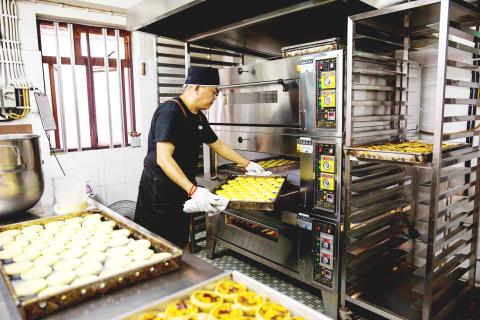With their flaky pastry casing, creamy custard filling and brulee topping, Macau’s Portuguese egg tarts are as much a part of the Chinese enclave’s fabric as its casinos — but their origin is surprisingly British.
Across the city it is not uncommon to see long lines of tourists patiently queuing for the sweet treats, a sight that might not seem all that surprising given the former Portuguese colony’s most famous dessert is based on Lisbon’s equally renowned pastel de nata.
But the current craze for Portuguese-style egg tarts — which has spread across China and parts of Asia in recent years — owes much of its success to a Briton who blundered into the business.

Photo: AFP
The tale began three decades ago when Essex-born industrial pharmacist Andrew Stow opened Lord Stow’s bakery at the southern harborside village of Coloane.
“In 1989, recognizing there were no Western street-side bakeries... he decided to do something for the local Portuguese community, which was to create a pastel de nata for them,” said Eileen Stow, Andrew’s sister, who now manages the business.
With no original recipe for pastel de nata to use, Andrew experimented with a heavier British custard filling, based on a family recipe, and Portuguese pastry techniques.
The creation initially raised a few eyebrows among Andrew’s Portuguese friends in Macau, but the local Chinese community became hooked.
Courtesy of the British, Cantonese cuisine already had a version of an egg tart, made with shortcrust pastry and a more jelly-like filling.
“To differentiate it from what they recognized in dim sum, a dan tat [egg tart in Cantonese,] they call it a po tat,” meaning Portuguese egg tart, Eileen said.
The creamier, flakier, richer versions were a roaring success.
“That’s how it grew before the days of ‘likes’ online. It’s just word of mouth,” added Eileen, who took over the business after her brother’s death in 2006.
The business now churns out 21,000 handmade egg tarts per day from three bakeries in Macau, and it also boasts two franchises in Japan and Manila.
A string of rivals have cropped up in the last three decades in Hong Kong, Taiwan and Singapore.
One of the best-regarded Macau competitors was set up by Andrew’s ex-wife Margaret Wong.
She sold her recipe to KFC, which now offers Portuguese egg tarts at outlets across China, a move that has introduced Macau’s Portuguese-British hybrid to hundreds of millions more hungry mouths.

On April 26, The Lancet published a letter from two doctors at Taichung-based China Medical University Hospital (CMUH) warning that “Taiwan’s Health Care System is on the Brink of Collapse.” The authors said that “Years of policy inaction and mismanagement of resources have led to the National Health Insurance system operating under unsustainable conditions.” The pushback was immediate. Errors in the paper were quickly identified and publicized, to discredit the authors (the hospital apologized). CNA reported that CMUH said the letter described Taiwan in 2021 as having 62 nurses per 10,000 people, when the correct number was 78 nurses per 10,000

As we live longer, our risk of cognitive impairment is increasing. How can we delay the onset of symptoms? Do we have to give up every indulgence or can small changes make a difference? We asked neurologists for tips on how to keep our brains healthy for life. TAKE CARE OF YOUR HEALTH “All of the sensible things that apply to bodily health apply to brain health,” says Suzanne O’Sullivan, a consultant in neurology at the National Hospital for Neurology and Neurosurgery in London, and the author of The Age of Diagnosis. “When you’re 20, you can get away with absolute

May 5 to May 11 What started out as friction between Taiwanese students at Taichung First High School and a Japanese head cook escalated dramatically over the first two weeks of May 1927. It began on April 30 when the cook’s wife knew that lotus starch used in that night’s dinner had rat feces in it, but failed to inform staff until the meal was already prepared. The students believed that her silence was intentional, and filed a complaint. The school’s Japanese administrators sided with the cook’s family, dismissing the students as troublemakers and clamping down on their freedoms — with

As Donald Trump’s executive order in March led to the shuttering of Voice of America (VOA) — the global broadcaster whose roots date back to the fight against Nazi propaganda — he quickly attracted support from figures not used to aligning themselves with any US administration. Trump had ordered the US Agency for Global Media, the federal agency that funds VOA and other groups promoting independent journalism overseas, to be “eliminated to the maximum extent consistent with applicable law.” The decision suddenly halted programming in 49 languages to more than 425 million people. In Moscow, Margarita Simonyan, the hardline editor-in-chief of the